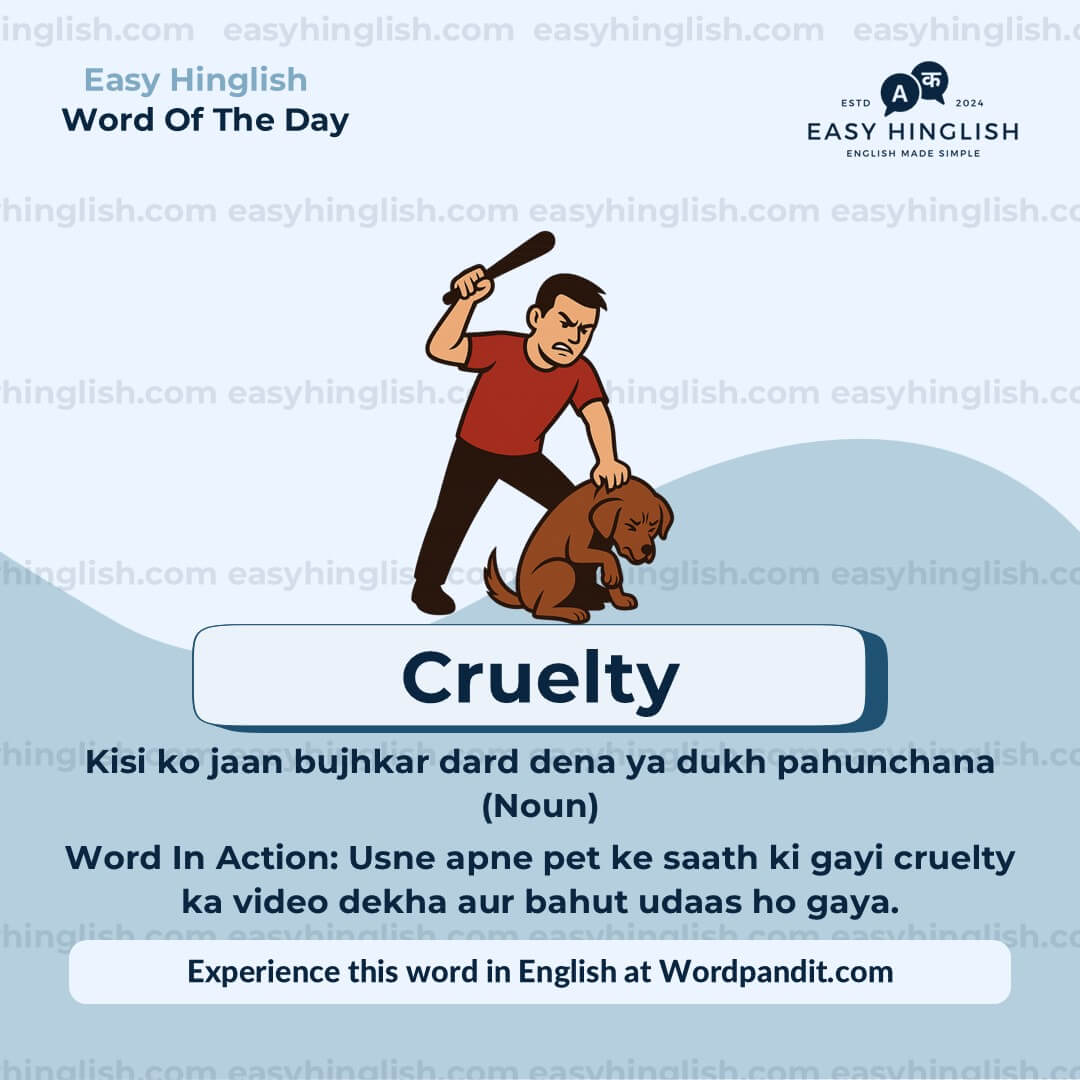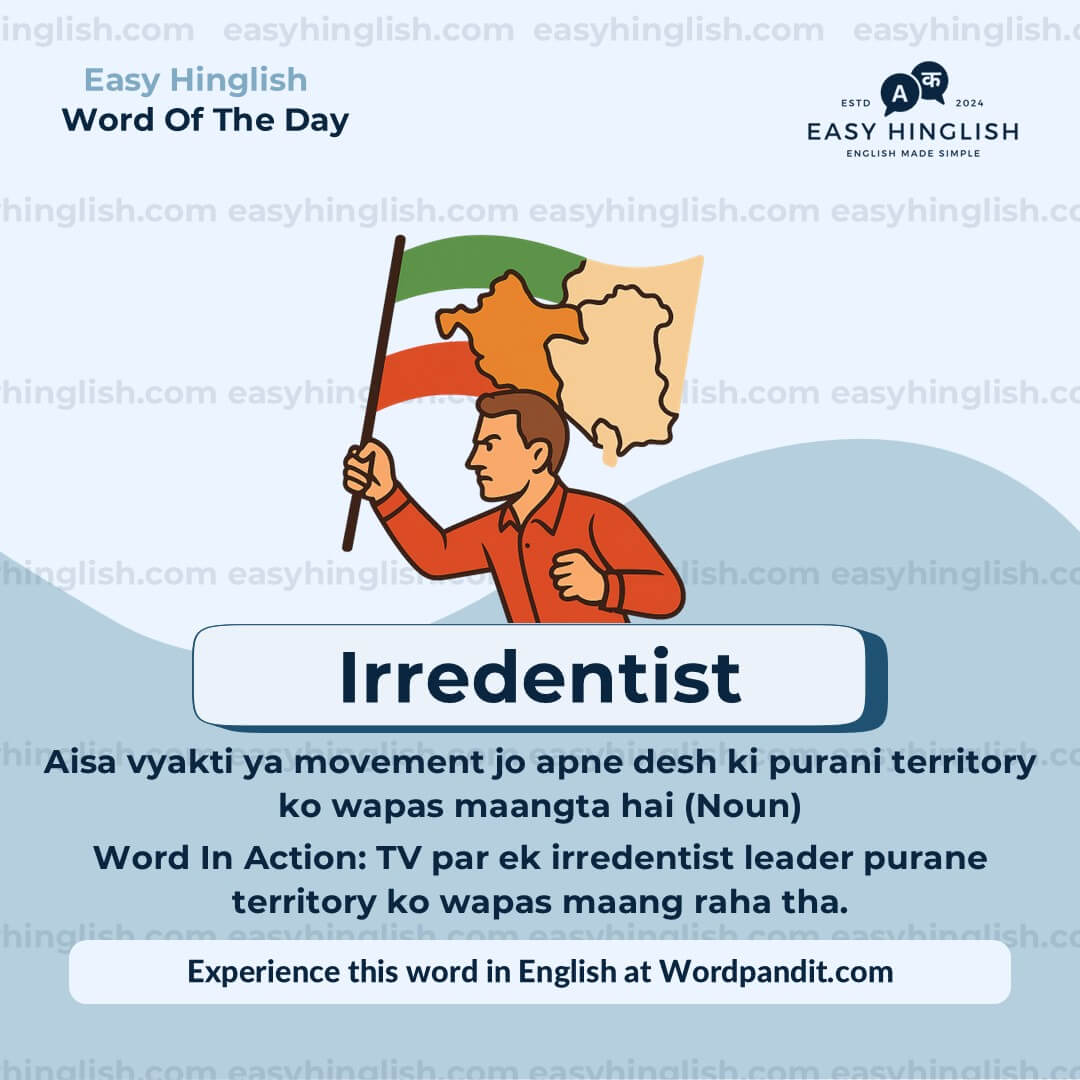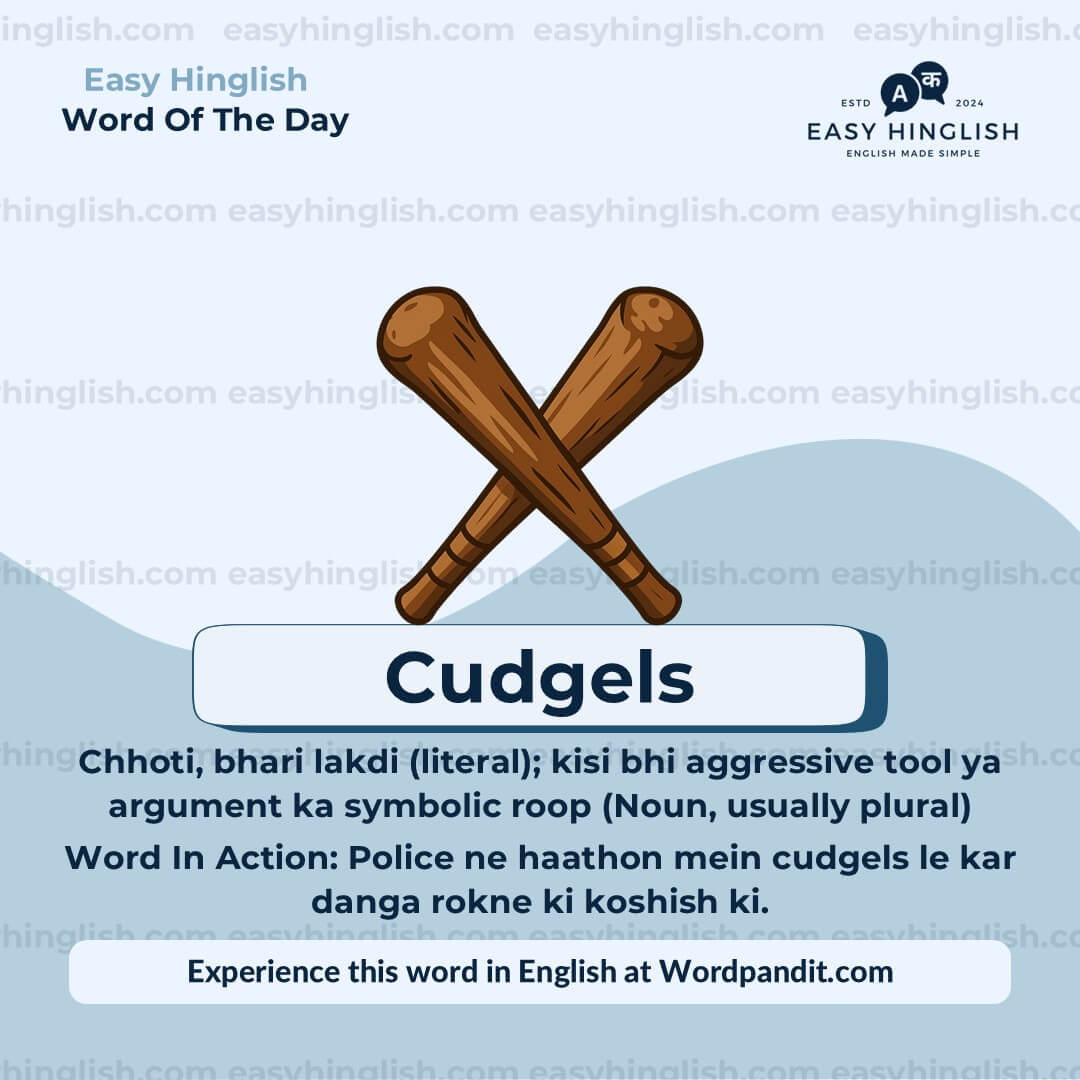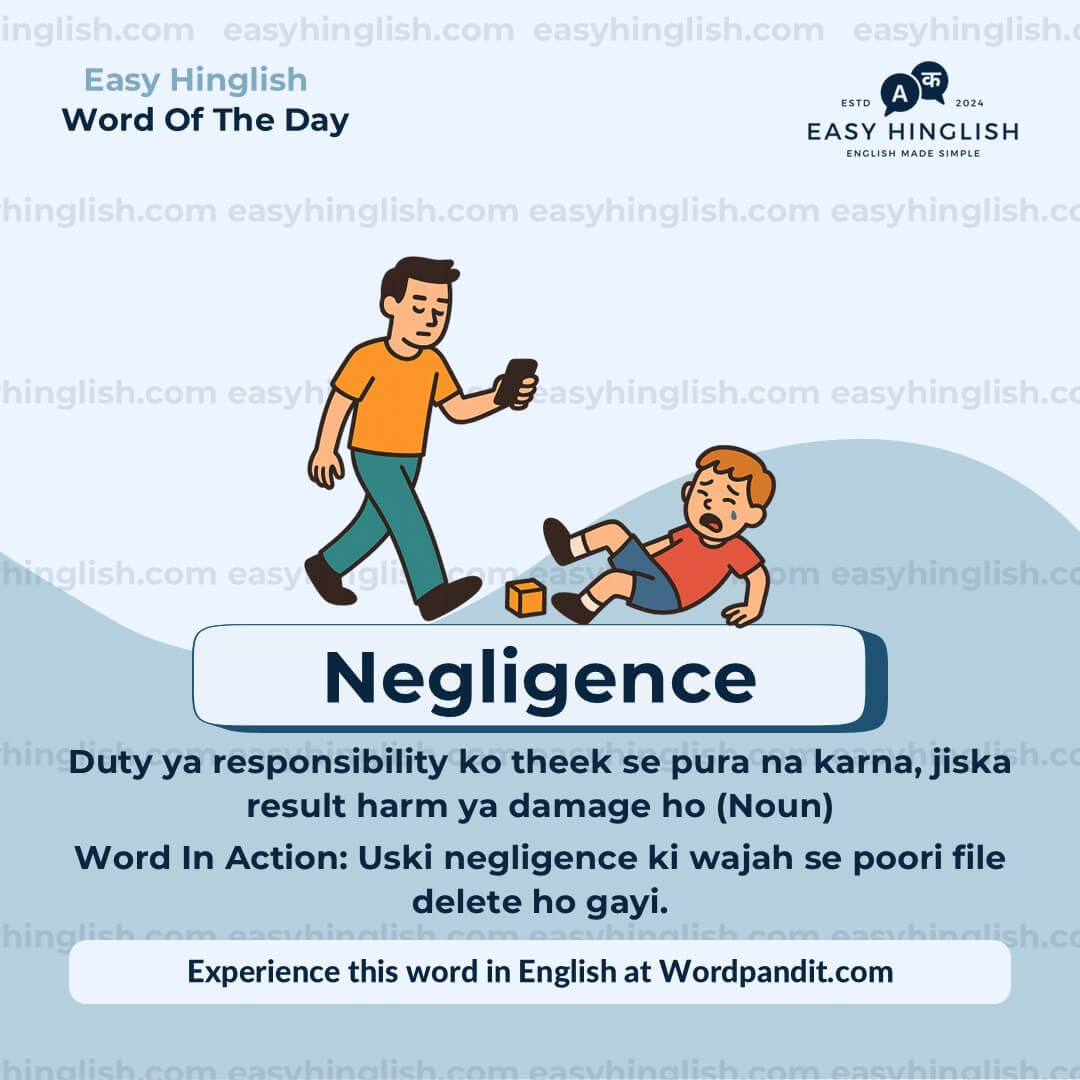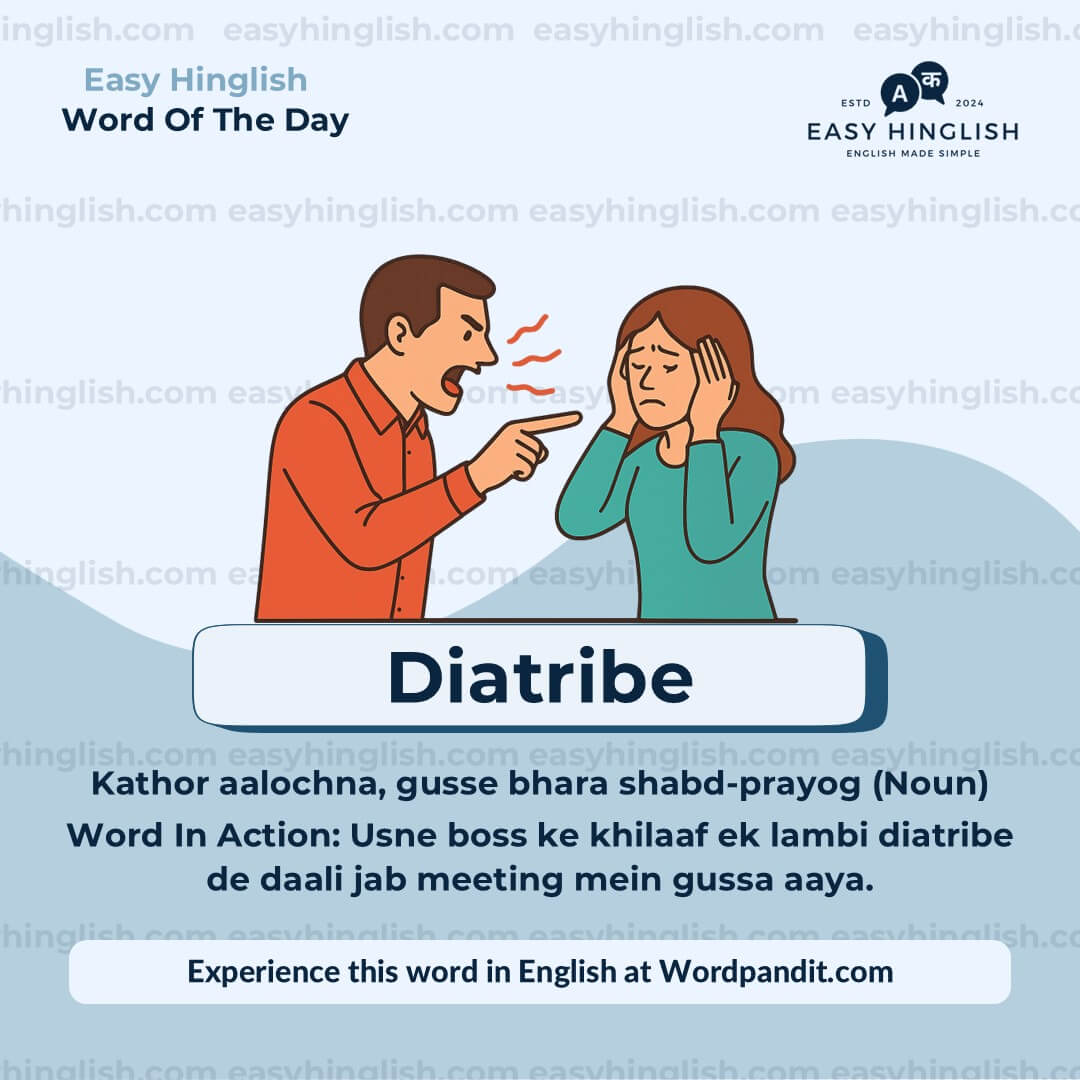Daily Vocabulary International Newspapers aur Publications se Seekho
Wordpandit ke Global Vocabulary Hub ke Saath Apni Vocabulary Expand Karo
Wordpandit par, hum aapko ek truly global vocabulary develop karne me madad karte hain, jo duniya ke sabse respected international publications se li gayi hoti hai. Yeh section aapko naye words se introduce karne ke liye design kiya gaya hai jo global conversations aur trends ko define karte hain.
Global Sources ka Power
Aapko globally sochne aur communicate karne me madad dene ke liye, hum vocabulary curate karte hain world ke top international sources se, jaise:
- The New York Times
- The Washington Post
- BBC
- The Guardian
- The Economist
- Scientific American
- Psychology Today
- Aur bhi bahut saare...
Globally Socho, Competitively Seekho
Hamare daily updates se aap international publications ke naye words seekhoge jo global news aur developments se jude hote hain. Isse aapki vocabulary current bhi rahegi aur globally relevant bhi.
Apni Global Soch Ko Expand Karo
Agar aap international exams ki tayari kar rahe ho, global business communication me excel karna chahte ho, ya sirf apni language skills improve karna chahte ho, toh Wordpandit aapko global level pe grow karne ke liye best resources provide karta hai.
Smart Learning, Global Reach
Hamari learning methodology me global examples, memory aids, aur interactive activities shamil hain, jo naye words ko effectively yaad karne aur real-world me use karne me madad karti hain.
Aaj Hi Apni Global Vocabulary Journey Shuru Karo!
Wordpandit Kyun Choose Karein?
Practical Learning: Aise words seekho jo real-world reading aur communication me aapko sach me kaam aayenge, taaki aapki comprehension aur bolne ki skills improve ho.
Diverse Content: Current affairs se lekar scientific breakthroughs tak, hamare different sources aapko multiple domains ki vocabulary seekhne ka moka dete hain.
Effortless Integration: Wordpandit ko apni daily routine ka part banao. Sirf kuch minute har din dene se aapki vocabulary time ke saath kaafi improve ho sakti hai.
Vocabulary Mastery Tak Ka Aapka Safar
- Regularly hamare Daily Vocabulary section ko visit karo
- Naye words explore karo aur unka context me use samjho
- In words ko apni writing aur bolne ki practice me use karne ki koshish karo
- Jaise-jaise aapke words badhte hain, apni progress ko track karo
Aaj Hi Apni Vocabulary Journey Shuru Karo!
Wordpandit ke saath vocabulary improve karna start karo. Roz thoda effort dalne se aap ek strong vocabulary develop kar sakte ho jo academic, professional, aur personal life me kaafi kaam aayegi.
Yaad rakho, ek naya shabd roz seekhna linguistic limitations ko door karne ka best tareeka hai! Wordpandit ko apni daily learning journey ka sathi banao aur vocabulary excellence ki taraf badho!
WORD-1: Cruelty
Sandarbh (Context):
"As bad as the cruelty is the cynicism. The changing borders and independence movements of the postwar era produced millions of refugees." - New York Times
Vyakhya (Explanatory Paragraph):
"Cruelty" ka matlab hota hai kisi ko jaan bujhkar ya bina parwah ke dard ya takleef dena. Jab koi insaan dusron ke dukh dard se bilkul bhi affected na ho aur unhe hurt kare, toh us act ko cruelty kehte hain. Politics, war ya personal relationships mein yeh word kaafi powerful aur emotional hota hai.
Arth (Meaning): Kisi ko jaan bujhkar dard dena ya dukh pahunchana (Noun)
Uccharan (Pronunciation): KROO-uhl-tee
Kathinai Star (Difficulty Level): ⭐⭐ Beginner
Utpatti (Etymology): Latin word "crudelitas" se aaya hai, jiska matlab hota hai "cruel" ya nirdai.
Prashant Sir Ke Tathya (Prashant Sir's Notes):
Yeh word emotionally kaafi impactful hota hai. Sirf physical nahi, emotional ya psychological dard bhi cruelty ke andar aata hai—jaise abuse, war crimes, ya kisi ka mental torture.
Samanarthi & Vipritarthi (Synonyms & Antonyms):
Samanarthi (Synonyms): brutality, savagery, harshness, inhumanity, heartlessness
Vipritarthi (Antonyms): kindness, compassion, mercy, empathy, gentleness
Udaharan (Usage Examples):
- Us dictator ke raj mein logo ke saath jo cruelty hui, usne duniya ko hila diya.
- Animal rights wale log har saal factory farming ki cruelty ke khilaaf protest karte hain.
Sanskritik Sandarbh (Cultural Reference):
"Cruelty of man itihas jitna hi purana hai." Yeh theme Holocaust par likhi Elie Wiesel ki book *Night* mein dikhayi gayi hai. – Literature Reference
Sochiye (Think About It):
Kya cruelty hamesha jaan bujhkar hoti hai? Ya kabhi kabhi ignorance aur beparwahi se bhi ho sakti hai?
Chhoti Kriya (Quick Activity):
3 aise real-life examples dhoondhiye (news, history ya literature se) jahan cruelty dekhi gayi ho. Har case mein aap kya alag karte?
Yaad Karne Ka Tarika (Memory Tip):
"Cruel" ko yaad rakhne ke liye sochiye kisi "Cold Ruler" ke baare mein jo logon ke saath nirdai ho—CRU(e)L = Cold Ruler → Cruelty.
Vastavik Jeevan Me Upyog (Real-World Application):
"Cruelty" ka use legal, media aur humanitarian fields mein hota hai—jaise "animal cruelty laws", "domestic cruelty cases" ya "war-time cruelty". Iska samajhna human rights aur ethics ke point of view se zaroori hai.
WORD-2: Irredentist
Sandarbh (Context):
"Israel and preserving the irredentist fantasy that someday their descendants will exercise what they believe is their 'right of return,' effectively through the elimination of the Jewish state." - New York Times
Vyakhya (Explanatory Paragraph):
"Irredentist" ek aise vyakti ya political movement ko kahte hain jo kisi aise territory ko wapas lene ki maang karta hai jo uske mutabiq pehle us desh ka hissa tha. Ye term zyadatar international politics mein use hoti hai, jahan disputed borders aur historical land claims ki baat hoti hai. Kabhi-kabhi is shabd ka use negative sense mein bhi hota hai, jab kisi movement ko over-nationalistic ya destabilizing maana jata hai.
Arth (Meaning): Aisa vyakti ya movement jo apne desh ki purani territory ko wapas maangta hai (Noun)
Uccharan (Pronunciation): ih-reh-DEN-tist
Kathinai Star (Difficulty Level): ⭐⭐⭐⭐ Advanced
Utpatti (Etymology): Italian word "irredentista" se aaya hai, jo "Italia irredenta" yaani "unredeemed Italy" se related hai—19th-century political movement.
Prashant Sir Ke Tathya (Prashant Sir's Notes):
Political vocabulary ka yeh ek kaafi important aur sensitive word hai. Irredentist ideas nationalist pride, historical memory aur perceived injustice se drive hote hain. Aise movements aksar border conflicts, war aur instability ka kaaran bante hain. Is word ka istemal cautiously karo.
Samanarthi & Vipritarthi (Synonyms & Antonyms):
Samanarthi (Synonyms): nationalist, expansionist, territorialist
Vipritarthi (Antonyms): federalist, integrationist, separatist (context ke hisaab se)
Udaharan (Usage Examples):
- Disputed border par irredentist claims ne dono deshon ke beech tensions badha diye.
- Kuch political leaders nationalist support paane ke liye irredentist language ka use karte hain.
Sanskritik Sandarbh (Cultural Reference):
"Italia irredenta" ek movement tha Italy mein, jisme un territories ko wapas lene ki maang thi jahan ethnic Italians rehte the—yeh irredentism ka classic European example hai.
Sochiye (Think About It):
Kya irredentist movements kabhi peacefully solve ho sakte hain, ya yeh hamesha conflict hi lekar aate hain?
Chhoti Kriya (Quick Activity):
2 aise irredentist movements identify kijiye (past ya present), unmein kaunse desh involved the aur kya land claim kiya gaya tha?
Yaad Karne Ka Tarika (Memory Tip):
"IRRE" = I re-claim + "DENT" = cut ya division → Irredentist = jo cut-off land ko wapas maangta hai.
Vastavik Jeevan Me Upyog (Real-World Application):
International relations aur geopolitics mein irredentism ek key concept hai. Russia ka Crimea lena, China ka Taiwan claim karna, ya Israel-Palestine issue sab irredentist politics ke example hain. Is word ko samajhna global conflicts ko samajhne mein madad karta hai.
WORD-3: Cudgels
Sandarbh (Context):
"They should not be cudgels in a never-ending struggle, subsidized from one aggrieved generation to the next by international largess." - New York Times
Vyakhya (Explanatory Paragraph):
"Cudgels" asal mein ek chhoti, bhari lakdi hoti hai jo maarne ke liye use hoti hai. Lekin modern usage mein iska matlab hota hai kisi idea, argument ya cause ka aise istemal karna jaise yeh ek weapon ho—jisse kisi par apna view ya power thopa ja sake. Is sentence mein, "cudgels" ka use metaphorically hua hai jahan kuch causes ya log generations tak sirf struggle aur conflict ke tools ban jaate hain, solutions ke nahi.
Arth (Meaning): Chhoti, bhari lakdi (literal); kisi bhi aggressive tool ya argument ka symbolic roop (Noun, usually plural)
Uccharan (Pronunciation): KUH-juhlz
Kathinai Star (Difficulty Level): ⭐⭐⭐ Intermediate
Utpatti (Etymology): Middle English "cuggel" se aaya hai, jo Old English "cycgel" se nikla hai—iska matlab tha peetne wali lakdi.
Prashant Sir Ke Tathya (Prashant Sir's Notes):
Literal meaning toh weapon ka hai, lekin editorial ya opinion pieces mein iska figurative use zyada hota hai. Jab kisi argument ya cause ko sirf ek ideological fight mein weapon banaya jaye, tab yeh word use hota hai—dhyan se padho jab kisi article mein yeh aaye.
Samanarthi & Vipritarthi (Synonyms & Antonyms):
Samanarthi (Synonyms): club, bludgeon, weapon, tool, instrument (figurative)
Vipritarthi (Antonyms): shield, defense, peace offering, olive branch
Udaharan (Usage Examples):
- Usne apne words ko cudgels ki tarah use kiya har political debate mein.
- Environment ko bachane ke liye activists ne cudgels uthaye.
Sanskritik Sandarbh (Cultural Reference):
“Take up the cudgels for” ek idiom hai 16th century ka, jiska matlab hota hai kisi ke liye ladna ya uska paksh lena. Shakespeare ke plays mein bhi is tarah ke symbolic weapons ka use hota tha loyalty ya conflict dikhane ke liye.
Sochiye (Think About It):
Jab koi cause apna asli meaning kho deta hai aur sirf ek political cudgel ban jaata hai—toh kya woh sach mein progress laa sakta hai?
Chhoti Kriya (Quick Activity):
"Cudgel" ka literal aur figurative dono sense mein ek chhoti paragraph likhiye—taaki contrast samajh aaye.
Yaad Karne Ka Tarika (Memory Tip):
“Cudgel” sunte hi sochiye ek “club-jewel” ki—jaise kisi ne ek bhari lakdi ko apna sabse precious argumentative weapon bana liya ho!
Vastavik Jeevan Me Upyog (Real-World Application):
Politics, media aur social issues mein kai baar log ya ideas sirf cudgels ban jaate hain—solution ke liye nahi, bas opposition ko harane ke liye. Jab yeh samajh mein aaye, tab hum better judge ban sakte hain ki kaun sach mein change chah raha hai aur kaun sirf ladaai kar raha hai.
WORD-4: Negligence
Sandarbh (Context):
"Gross negligence or quiet complicity — they need to resign now." - New York Times
Vyakhya (Explanatory Paragraph):
"Negligence" ka matlab hota hai zimmedari nibhaane mein fail ho jaana ya careless hona—aisa fail hona jo kisi nukhsan, injury ya problem ka kaaran ban jaata hai. Legal aur moral dono context mein iska use hota hai. Jab kisi ko duty di gayi ho lekin woh us duty mein dhyan nahi deta, toh uss vyakti ko negligent maana jaata hai. "Gross negligence" ka matlab hai extreme level ki laaparwahi, jise ignore nahi kiya ja sakta.
Arth (Meaning): Duty ya responsibility ko theek se pura na karna, jiska result harm ya damage ho (Noun)
Uccharan (Pronunciation): NEH-gli-jenss
Kathinai Star (Difficulty Level): ⭐⭐ Beginner
Utpatti (Etymology): Latin word “negligentia” se nikla hai, jiska matlab hota hai “carelessness”.
Prashant Sir Ke Tathya (Prashant Sir's Notes):
Yeh word legal aur ethical dono fields mein bahut important hai. Law mein yeh define karta hai ki kab koi person "reasonable" tareeke se act nahi kar raha. Life mein bhi agar aap kisi cheez ko lightly lete ho ya ignore karte ho, toh aap negligent ho. Seekho is word ko as a legal concept aur ek daily life lesson dono ke roop mein.
Samanarthi & Vipritarthi (Synonyms & Antonyms):
Samanarthi (Synonyms): carelessness, oversight, irresponsibility, inattention
Vipritarthi (Antonyms): diligence, attentiveness, responsibility, carefulness
Udaharan (Usage Examples):
- Accident driver ki negligence ki wajah se hua kyunki usne traffic rules follow nahi kiye.
- Hospital mein medical negligence ke kaaran patient ki death ho gayi.
Sanskritik Sandarbh (Cultural Reference):
Law ke field mein “negligence” ek major concept hai. 1932 ka *Donoghue v Stevenson* case (UK) mein "duty of care" ka principle establish hua, jo negligence ko legally define karta hai.
Sochiye (Think About It):
Kya negligence hamesha sirf laziness ka result hoti hai? Ya kabhi distraction, fear ya lack of awareness bhi uska reason ban sakte hain?
Chhoti Kriya (Quick Activity):
Do chhoti situations likhiye: ek normal negligence aur ek gross negligence ka example. Dono mein kya farak tha aur outcome kya aaya?
Yaad Karne Ka Tarika (Memory Tip):
"Negligence" mein "neglect" chhupa hai—agar aap kisi zimmedari ko neglect karte ho, toh aap negligence dikhate ho.
Vastavik Jeevan Me Upyog (Real-World Application):
Negligence ka use hospitals, courts, offices sab jagah hota hai. Jaise: "negligence case", "medical negligence", ya "gross negligence in duty". Is word ko samajhne se aap accountability aur ethics ko behtar samajh sakte hain.
WORD-5: Diatribe
Sandarbh (Context):
"An angry customer's harsh criticism directed at a store manager." - New York Times
Vyakhya (Explanatory Paragraph):
"Diatribe" ka matlab hota hai ek lambi aur aggressive speech ya likha hua attack jo usually kisi person, group ya idea ke against hota hai. Isme harsh criticism hota hai aur aksar emotional tone bhi hoti hai. Matlab jab koi banda gusse mein kisi par verbal attack kare with strong words, to usse diatribe kehte hain.
Arth (Meaning): kathor aalochna, gusse bhara shabd-prayog (Noun)
Uccharan (Pronunciation): DAI-uh-traib
Kathinai Star (Difficulty Level): ⭐⭐⭐ (Hard)
Utpatti (Etymology): Greek word "diatribein" se aaya hai, jiska matlab hai "to wear away with words" yaani shabdon se attack karna.
Prashant Sir Ke Tathya (Prashant Sir's Notes):
"Diatribe" ek formal word hai jo newspaper articles aur political speeches mein use hota hai. Iska tone hamesha strong aur attacking hota hai. Aap ise "rant" se compare kar sakte ho, lekin rant thoda casual hota hai, jabki diatribe zyada serious aur structured criticism hota hai.
Samanarthi & Vipritarthi (Synonyms & Antonyms):
Samanarthi (Synonyms): tirade, rant, polemic, harangue, invective
Vipritarthi (Antonyms): praise, compliment, commendation
Udaharan (Usage Examples):
- Political leader ne apne opponent ke against ek diatribe launch ki.
- Twitter par celebrities aksar trolls ke diatribes ka shikaar hote hain.
Sanskritik Sandarbh (Cultural Reference):
"TV debates mein anchors aksar apna diatribe start kar dete hain, jisme arguments ke bajaye shouting zyada hoti hai." - Media Culture
Sochiye (Think About It):
Aaj ke digital era mein diatribes zyada harmful hain (jaise social media trolling), ya woh ek healthy democracy ka hissa hai?
Chhoti Kriya (Quick Activity):
"Diatribe" aur "Rant" mein fark samajh kar dono ka ek-ek example likhiye.
Yaad Karne Ka Tarika (Memory Tip):
"Diatribe = Die + Tribe" → Socho ek tribe itna gusse mein hai ki apne words se dusri tribe ko ‘destroy’ karne ki koshish kar rahi hai.
Vastavik Jeevan Me Upyog (Real-World Application):
Real life mein diatribe ka use aksar politics, customer complaints, social media trolling, aur public speeches mein hota hai jaha strong aur angry criticism kiya jata hai.



